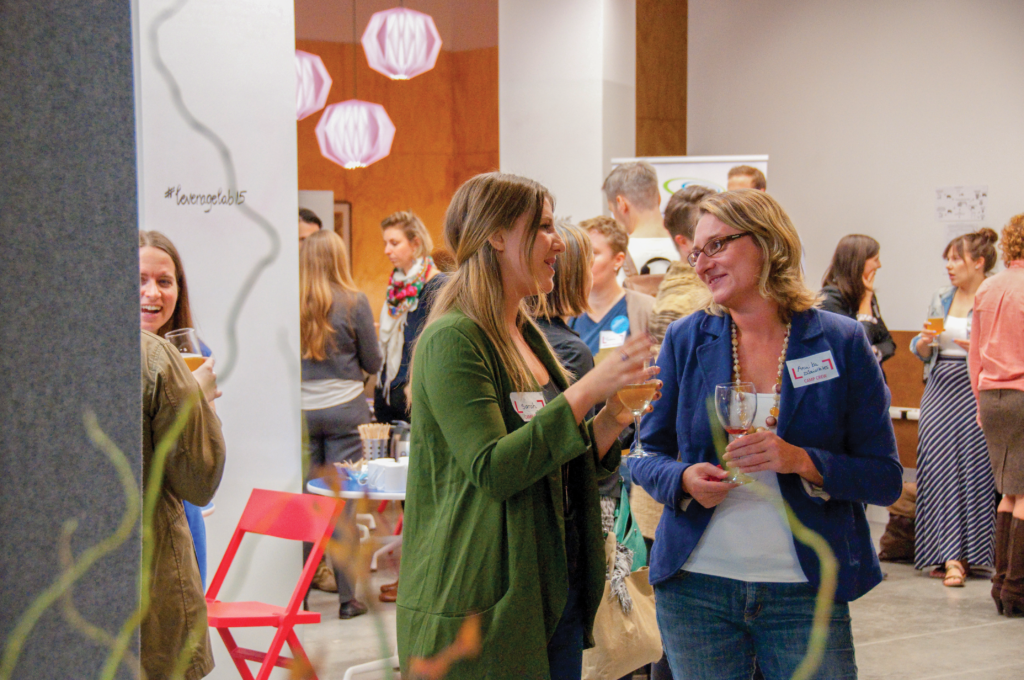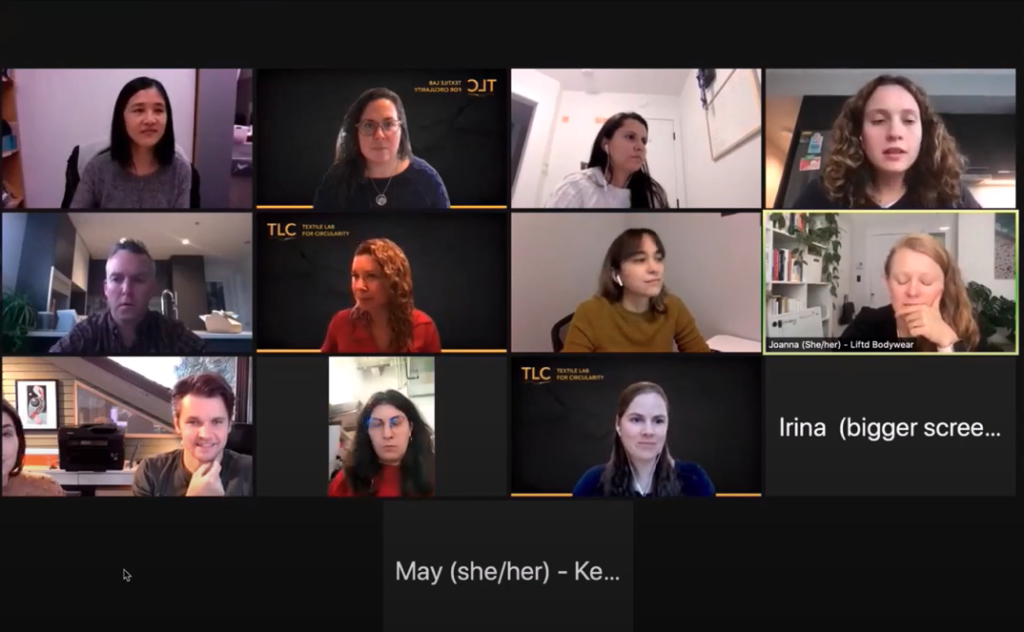No shirts, no shoes, no service. Clothing is essential for survival and navigating modern society; however, the shirts on our back have also evolved to be emblems of our status and reflect our unique personalities — all great qualities until it’s time to retire that novelty souvenir t-shirt we wore once as a joke.
The Textile Lab for Circularity is fighting fashion and textile waste in Canada through extensive research and collaboration with industry players. We spoke with Megan Bourassa, Impact Strategist & Project Manager, to learn more about the Textile Lab for Circularity’s fashion-focused initiatives in the circular economy space.

Tell us about Textile Lab for Circularity’s mission.
The Textile Lab for Circularity is a social innovation lab connecting unlikely allies across Western Canada to divert fashion and textile waste from landfills and move the industry toward circularity. We envision a thriving circular textiles economy in British Columbia by 2031.
We believe that collaboration is key to making the circular economy a reality, and we strive to build the spaces for strategic cross-sector connections and industry clusters to form and flourish.
What inspired you/your founders to start your organization?
While facilitating a social innovation lab for the hospitality industry in 2015, our founder Sara Blenkhorn witnessed the severity of the textile waste problem. She saw that textile waste resulted from almost every stage of the product life cycle, with no comprehensive, scalable solutions to divert this waste from the landfill. Folks working on solutions were isolated from each other, and she saw an opportunity to bring them together to make more progress, faster.
She launched the first textile-focused lab through her consulting firm Leverage Lab. This two-year interactive lab program resulted in a whitepaper that mapped the flows of textile waste in Metro Vancouver and identified leverage points to take action.
The first lab identified that in Metro Vancouver alone, upwards of 22,000 tonnes of textiles make their way to landfills annually. We also know that approximately 95% of this landfill waste is repairable, reusable, or recyclable, showing a large opportunity for the circular economy. This opportunity is what inspired Sara to start the Textile Lab for Circularity.
What were some of the challenges you/your founders encountered?
There are a few challenges we’ve encountered and continue working on, including pivoting from in-person programming to 100% online due to the pandemic; pivoting to the changing needs of the industry during this turbulent time, thus redesigning our offerings to work for companies that had pivoted away from long-term climate and waste prevention strategies to short-term pandemic mitigation; and minimizing Textile Lab for Circularity added-value activities to extend the lifetime of our initial funding save money.
As well, there are some challenges we’re encountering on an ongoing basis, including juggling the back and forth between the industry needing regulation and legislators waiting for the industry to take the lead.
And more recently, we have seen an emerging need in our networks for reshoring textile/fashion production due to unstable supply chains. However, there are gaps in the workforce and infrastructure to make that a reality at the moment.

What do you consider to be Textile Lab for Circularity’s biggest success?
Our biggest success since our official formation in 2019 is our massive pivot that led to producing our now-annual Building Your Circular Strategy Workshop!
From 2017-19 we partnered with Vancity, The City of Vancouver, Metro Vancouver, and the Vancouver Economic Commission to convene 25 businesses and organizations from textiles-related sectors to collaborate on the issue of regional textile waste. We mapped the regional textile system through participant and network interviews and secondary data sources, and we produced the whitepaper, Unravelling the Problem of Apparel Waste in the Greater Vancouver Area. This study revealed a systems map of apparel waste flows in the Lower Mainland, establishing critical baseline data. This foundation positions us well to identify and act on opportunities that disrupt the conventional take-make-waste process.
The Textile Lab for Circularity was formed as a result of this whitepaper and its five leverage points for systemic change: increasing industry collaboration, investing in circular fibre development, educating consumers, levelling the playing field, and, ultimately, making circular fashion business models mainstream.
We designed and began marketing a Phase 2 lab in the winter of 2020 to take serious collaborative action on the leverage points that the whitepaper identified; however, COVID-19 disrupted this plan. Unfettered, we performed an in-depth analysis of the leverage points and the emergent needs of the industry. We determined that our lab model could be parsed out into two phases: an educational workshop to level the playing field and tangible pilot projects down the line.
As a result, we successfully recruited and guided nine organizations through our new educational program and are now gearing up for a second cohort.
What makes Textile Lab for Circularity unique?
We act like mycelium around the complex systemic issues of textile waste, transmitting knowledge, connections, and resources between key nodes when they wouldn’t otherwise relate. We believe that by breaking down silos in this highly-competitive industry and open sourcing key research and resources, we can move the whole industry further, faster.
We also employ the science-based Framework for Strategic Sustainable Development, grounding our programs in a holistic methodology that accounts for the long-term well-being of both people and planet. This helps us guide the industry toward addressing the root problems, rather than implementing band-aid reactionary strategies.

How do you feel your organization makes the world better?
Our organization is composed of sustainability experts with deep experience in education and facilitation. We make the world better by championing collaboration in an increasingly competitive world. By creating safe spaces for exploration, open conversation, and sandboxes for play, we are able to spark ideas and partnerships otherwise inaccessible.
We also aim to facilitate and normalize the open sourcing of key research to move the industry forward together.
Tell us about Textile Lab for Circularity’s goals.
As mentioned, we aim to create a thriving circular apparel industry in British Columbia by 2031. To get there, we are focused on taking action on these five leverage points designed to catalyze systemic change: 1) increase industry collaboration in the collection, sorting, recycling, and design for the environment; 2) invest in circular fibres development, recycling technology, and collection infrastructure; 3) educate consumers, designers, and brands about their role in a zero-waste fashion future; 4) set a level playing field that supports the reduction of apparel waste; and 5) make circular fashion business models mainstream.
Are there any upcoming initiatives or projects you’d like to share?
One project we’d like to share is our upcoming landmark research project, the Roadmap to Textile Recycling in Western Canada. This roadmap is a cross-sector study engaging folks from government, industry, non-profit, academia, and funding to forge a path through the complex ins and outs of making scalable textile recycling in Western Canada a reality.
The second initiative we’d like to share is gearing up for the second cohort of our one-of-a-kind Building Your Circular Strategy program. This four-session training is designed to spark circular strategies for long-term resilience in BC’s fashion and textile organizations. Together, we help companies understand their current system, set a circular mission, and develop a custom plan for embedding circularity into their business model. Teams will leave with their own internal Circular Strategy and the confidence to implement and communicate it internally and externally.
What do you most want people to know about your organization?
We truly believe that the future is collaborative. Together, we have the know-how, the resources, and the passion to make the apparel industry circular. As a non-profit organization, we are not driven by money but rather by the quality of the connections we facilitate. We measure our success on impact — all the way from individual conversations to systemic shifts.
How can people help or contribute to Textile Lab for Circularity’s mission?
Non-profit, laser-focused Social Innovation Labs like ours are a key ingredient in catalyzing and accelerating innovation. We realize this is still a new concept to many, so please join us, support us, and amplify our work!
Some ways to get involved is to join or sponsor one of our programs, subscribe to our newsletter, and follow us on social media at @textilelabforcircularity.
This story was featured in the Make The World Better magazine:
Learn about more world-changing individuals and organizations:
- Brands for Better Foundation: Uniting for Impact
- Circular Economy Leadership Canada: Advancing Innovation
- Circular Rubber Technologies: Re-Tiring Rubber Waste
- EcoMeter: Measuring Foodprints to Support Sustainability
- Enerkem: Repurposing Waste to Fuel Our Lives
- FoodMesh: Rescuing Food for the Sake of People and Planet
- Project Learning Tree Canada: Planting Conservation Literacy
- Susgrainable: Fighting Food Waste with Fibre
- Too Good To Go: Satisfying Your Appetite for Sustainability


